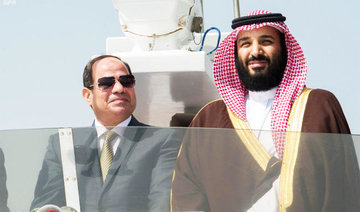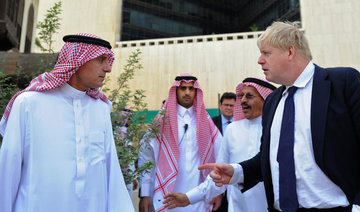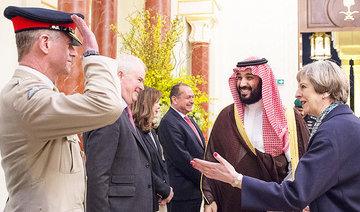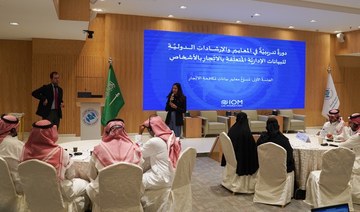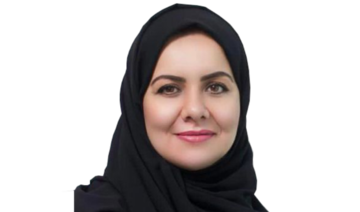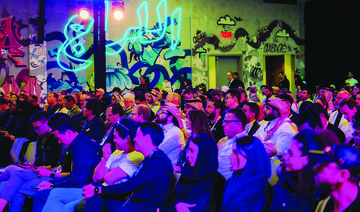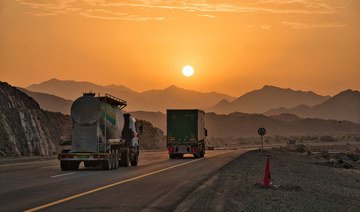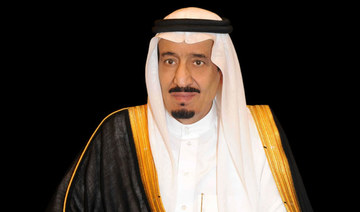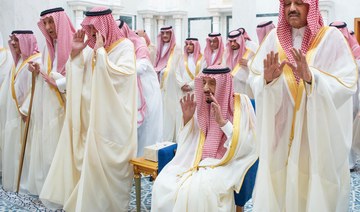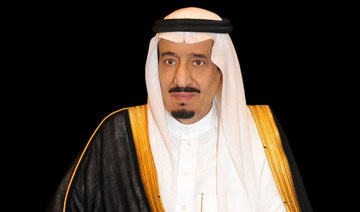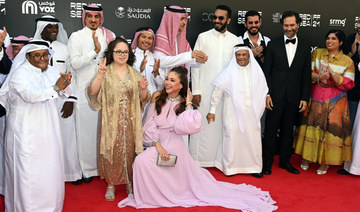LONDON: People in the UK and Saudi Arabia are much safer if the two countries have a close relationship, the Kingdom’s Crown Prince Mohammed bin Salman said ahead of his visit to Britain.
Prince Mohammed arrived in the UK from Cairo last night to begin the second leg of his first overseas tour since becoming heir to the throne.
In an interview with The Daily Telegraph newspaper, the crown prince said Brexit potentially freed up Britain to do more business with the Kingdom.
“We believe that Saudi Arabia needs to be part of the global economy,” he said. “People need to be able to move freely, and we need to apply the same standards as the rest of the world. After Brexit, there will be huge opportunities for Britain as a result of Vision 2030.”
He said the two countries enjoyed historic ties that dated back more than 100 years to the foundation of the Kingdom.
“We have a common interest that goes back to the earliest days of the relationship,” he said, adding: “Our relationship with Britain today is super.”
The 32-year-old crown prince, who is making his first official visit to Britain, has overseen a raft of reforms to modernize the Kingdom.
During the trip, he will meet with Prime Minister Theresa May, the Queen and other members of the British royal family.
A number of events have been scheduled, including a forum on business partnerships between the two countries and a discussion event at Chatham House.
The visit is expected to focus on defense, security and economic ties. The two sides will also review key bilateral and regional issues.
Billboards highlighting his UK visit have been erected in parts of the capital, Saudi state-news channel Al-Ekhbariya reported.
One shows the flags of the two countries with “United Kingdoms” written across the top. Another shows Crown Prince Mohammed with the slogan: “He is bringing change to Saudi Arabia.”
The Telegraph interview touched on the wide-reaching reforms in the country that include allowing Saudi women to drive, work and run businesses.
He said that while Vision 2030 worked to diversify the economy, the inclusion of women in driving that economy was essential to the long-term success of the project.
The crown prince said that global travel had made Saudis increasingly aware how other countries operated. Such an insight, he explained, had led to a change in the aspirations of the country’s younger population.
Currently, UK trade with Saudi Arabia and the other Gulf states accounts for 10 percent of total commercial transactions — more than the total amount of trade with China, the newspaper added, citing British diplomats.
Security and intelligence cooperation are expected to feature heavily during talks in the UK.
“The British and Saudi people, along with the rest of the world, will be much safer if you have a strong relationship with Saudi Arabia,” the crown prince said.
He said the job at hand was to promote a “more moderate Islam,” to counter the “extremists and the terrorists (who) are linked through spreading their agenda.”
Economic growth in Saudi Arabia would benefit the rest of the Middle East, which would help to defeat extremism.
He dismissed claims that the Saudi government’s current stance against Iran and Qatar could potentially provoke new regional conflict.
Britain was “very supportive” of the Kingdom’s concerns over Iran and other regional security issues, he said.
Before leaving Egypt, Crown Prince Mohammed visited Al-Azhar, the world’s leading seat of learning for Sunni Muslims.
Accompanied by Sheikh Ahmad Al-Tayyeb, the Grand Imam, he was shown the completed restoration work carried out on Al-Azhar Mosque.
The three-year project was financed by a grant from Saudi Arabia. The mosque, built in the 10th century, is now part of a sprawling university, which teaches Islam as well as secular subjects, and a nationwide network of schools.
Hundreds of Al-Azhar students met the crown prince and Egypt’s President, Abdel Fattah El-Sisi.
During the trip, Crown Prince Mohammed visited the main Christian cathedral in Cairo and met the head of the Coptic church. He also toured infrastructure projects and the Suez canal and attended a play at Cairo Opera House.
The two countries signed deals linked to investment funds and the building of a project in Sinai connected to Saudi Arabia’s Neom megacity project.
Saudi Arabia’s Crown Prince says Brexit opens UK for greater business opportunities with Kingdom
Saudi Arabia’s Crown Prince says Brexit opens UK for greater business opportunities with Kingdom
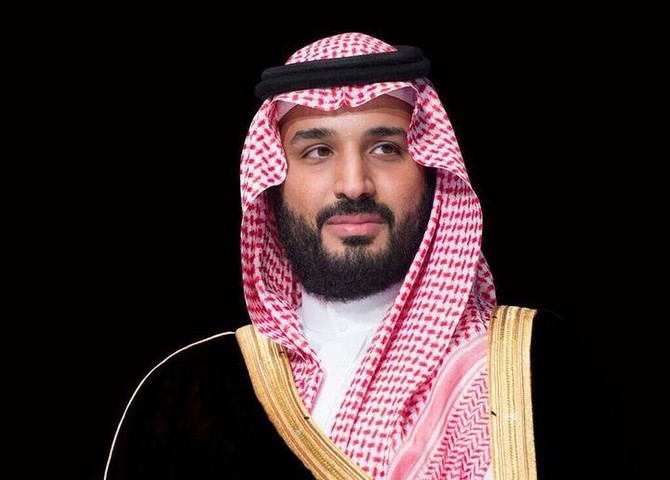
Experts discuss Saudi Arabia’s latest anti-trafficking measure

- Symposium raised awareness of common patterns and recent developments in human trafficking, along with effective means of protection and prevention
- Human trafficking encompasses sex trafficking, forced labor and domestic servitude, often involving women and children
RIYADH: Experts discussed Saudi Arabia’s latest efforts to combat human trafficking at an event in Riyadh on Wednesday.
The symposium, titled “Enhancing Cooperation in Combating Trafficking in Persons,” drew attendees from a variety of fields to review anti-human trafficking policies.
It also raised awareness of common patterns and recent developments in human trafficking, along with effective means of protection and prevention.
“At the Saudi National Committee to Combat Human Trafficking, we aim to exchange experiences and foster coordination to combat human trafficking, prevent its occurrence, reduce its impact on victims and protect them,” said Hala Al-Tuwaijri, president of the Human Rights Commission.
During a panel discussion titled “Normative and International Framework to Combat Trafficking in Persons,” Al-Tuwaijri warned that crises and conflicts around the world create a fertile environment for traffickers to exploit the vulnerable.
Human trafficking encompasses sex trafficking, forced labor and domestic servitude, often involving women and children.
Al-Tuwaijri said that human trafficking transcends borders. By working together across countries and regions, the international community can protect the vulnerable and uphold human rights, he added.
Per Saudi law, those found guilty of human trafficking in the Kingdom face up to 15 years’ imprisonment, fines of up to SR1 million ($266,000), or both.
Al-Tuwaijri highlighted the importance of bolstering international efforts to combat human trafficking through comprehensive legislation and enhanced case detection.
In 2023, anti-human trafficking organizations in the Kingdom conducted 41 training programs, aiming to raise awareness of vulnerabilities to trafficking within migrant communities. The training covered victim identification, best practices in screening vulnerable populations in detention centers, trauma-informed and victim-centered interviewing and assistance techniques, search procedures, evidence collection and criminal investigative processes during trafficking trials.
Abdullah Abu Thunin, vice minister of human resources and social development, said that significant efforts are being made in the Saudi labor market to combat human trafficking.
The ministry is activating a national plan to combat human trafficking, he added. The strategy is based on four main pillars: Prevention, protection and assistance, prosecution, and national, regional and international cooperation.
Abu Thunin said that the ministry has launched several programs to target human trafficking, including one scheme to improve contractual relationships.
“Through the authenticated contracts program and the wage protection program, more than 7 million contracts were signed by employees, obligating employers to pay workers’ wages,” he added.
The Friendly Settlement for Labor Disputes program also achieved a 77 percent reconciliation rate in labor disputes.
Abu Thunin said that compliance rates have increased in the Kingdom since the programs were launched.
Many government agencies, including the Ministry of Interior, Ministry of Human Resources and Social Development, the Public Prosecution, the Human Rights Commission and the National Committee to Combat Trafficking, took part in the Riyadh symposium.
Numerous international organizations also attended, including the UN International Children’s Emergency Fund, the UN Office on Drugs and Crime and the UN Resident Coordinator Office.
AI heralds new era for art, music, Riyadh summit told
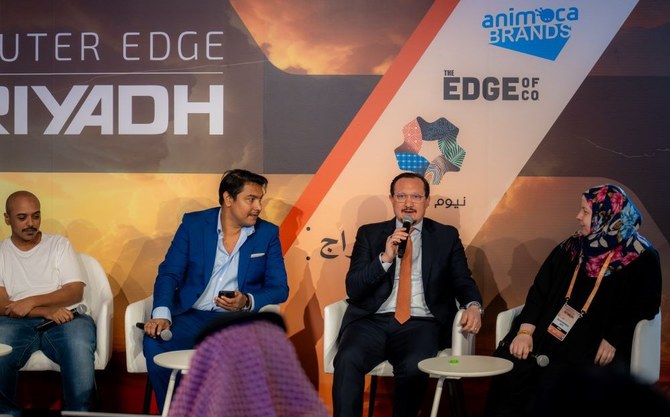
- Forum explored innovations linked with Web3, a new stage of the internet driven by the cryptocurrency-related technology blockchain
- Web3 is expected to provide greater security, and give users more control over their data, opening new horizons for musicians and artists
RIYADH: Music has always been at the cutting edge when it comes to utilizing technological innovation, Paul Pacifico, CEO of the Saudi Music Commission, told a forum in Riyadh.
Experts discussed the impact of artificial intelligence on the creative industries during the Outer Edge summit held at The Garage in the Saudi capital on Tuesday.
The forum explored innovations linked with Web3, a new stage of the internet driven by the cryptocurrency-related technology blockchain.
Web3 is expected to provide greater security, and give users more control over their data, opening new horizons for musicians and artists, among others.
“Musicians have always experimented with every tool they could get their hands on,” Pacifico said during a panel titled “The Future of Creativity, including Music and Art.”
He cited the invention of the piano as an example, and said that artists would explore any medium or utilize any tool to convey their message.
“AI is everywhere, and is somewhat of a catch-all term for several technologies that converge around machines,” he said.
Pacifico encouraged artists to explore AI, adding that it is already integrated into many areas of their working life.
“We’ve already experienced AI in the creative space through algorithmic playlists on streaming platforms, backend processing, digital music production, and editing with software programs.”
The discussion also explored the intersection of technology and art, with speakers highlighting the potential for immersive experiences that merge the physical and digital worlds.
Saudi artist Khaled Makshoush, who works with digital pixel designs, is optimistic about AI applications in the creative realm, saying that that he sometimes uses the technology as a source of inspiration and a tool to enhance his artistic processes.
He said that some people view AI negatively because it can generate art based on the work of other artists.
“I would generate an image with AI to be inspired by what elements or colors to incorporate into a painting.”
Makshoush said that because he is quite indecisive, “an AI assistant who can advise me based on my previous artworks would be very beneficial.”
Melissa Wiederrecht writes JavaScript code to generate her artwork, and uploads her creations on web3.
The algorithmic and generative artist said that one exciting aspect of Web3 is its potential to showcase artwork in new and innovative ways. Artists can use blockchain technology to create unique digital pieces, secure ownership rights, and sell their work to collectors.
“For example, I’ll have AI pick five random colors; then maybe I’ll say pick a random sample of points, then throw some color around, and choose a style of mine,” she said.
Wiederrecht said that she can write an algorithm that generates infinitely different pieces of art from the same code.
“They all look similar, like they belong to the same collection, but they’re all completely unique,” she added.
Pacifico concluded by saying: “I want to see that bedrock that we’re putting in place enable generations after us to have much greater access to the freedom of expression and circular economy required to enable access for more expression for all.”
Saudi Environment Ministry launches first urban farm inside stores
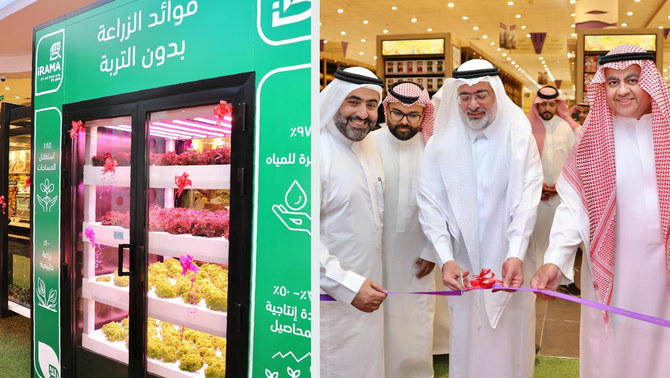
- Initiative allows customers to obtain fresh food products grown in the Kingdom.
- The ministry aims to launch about 600 to 1,000 farms in the retail system across all markets in the Kingdom over the next five years
Riyadh: The Ministry of Environment, Water and Agriculture launched an urban vertical farm project for food markets and stores, the Saudi Press Agency reported.
The initiative, the first of its kind in the region, allows customers to obtain fresh food products grown in the Kingdom.
The ministry’s undersecretary, Ahmed Al-Eyada, attended the launch of the project, which was implemented by a leading bioagriculture company.
Danube markets in Riyadh is hosting the first vertical farm in the project. Commercial display units in the market contain a variety of plants and agricultural products, such as lettuce, coriander, parsley and broccoli — many of which were previously sourced from abroad.
The ministry aims to launch about 600 to 1,000 farms in the retail system across all markets in the Kingdom over the next five years. These farms are intended to meet 20 to 40 percent of domestic demand for agricultural products and vegetables.
Vertical urban farms in stores aim to preserve natural resources, maintain ecosystem balance and promote sustainable productivity. By shortening supply chains, they also reduce loss and waste, and introduce a new farming model suited to local farmers and businesses in the Kingdom.
The initiative offers multiple benefits for consumers by providing high-quality vegetables and fruits that retain their freshness and nutritional value for up to five times longer than traditional methods, the SPA reported.
Urban farms also promote job localization and greater income potential. Furthermore, they help overcome logistical challenges associated with transporting agricultural products to consumers.
Vertical farming not only conserves agricultural land but also reduces labor and water usage by 80 to 90 percent compared to traditional farming, providing a year-round high-yield agricultural environment.
Saudi Arabia’s King Salman admitted to hospital for routine checkup

JEDDAH: Saudi Arabia’s King Salman has been admitted to King Faisal Specialist Hospital and Research Centre in Jeddah for routine check up, state news agency (SPA) reported.
The tests were expected to last “a few hours”, the Royal Court said, as cited by SPA.
King Salman attended on Tuesday the weekly cabinet meeting.
King Khalid Foundation, TATA sign pact to promote sustainable digital practices
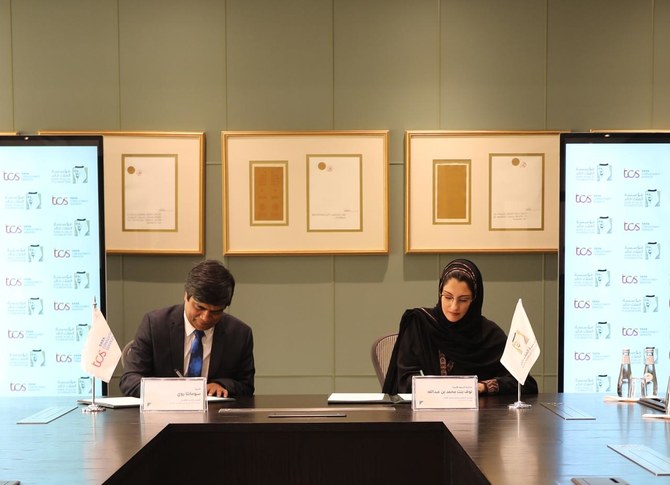
- University students urged to present proposals for ‘Sustainathon’ contest
RIYADH: The King Khalid Foundation has signed a cooperation agreement with TATA Consultancy Services to promote sustainable digital practices among university students in Saudi Arabia.
The initiative is called “Sustainathon” and aims to help students design projects that would assist in this field, according to a statement released by the foundation on Monday.
For three months, the King Khalid Foundation and the TCS will be running online seminars to help “Sustainathon” competitors with their proposals.
At the end of the period, the students will be required to present their ideas to a panel of judges.
Prizes will be awarded based on adherence to the UN Sustainable Development Goals, as well as practical applications.
During the signing ceremony, the King Khalid Foundation was represented by its CEO Princess Nouf bint Muhammad bin Abdullah Al-Saud. The TCS was represented by its President and Regional Director for the Middle East and Africa Sumanta Roy.
The King Khalid Foundation and the TCS aim to develop cooperation between stakeholders in the private and not-for-profit sectors through information exchange and the sharing of expertise.
The King Khalid Foundation was established in 2001 as an independent national non-profit body. Its vision is to develop a prosperous society rooted in equality and sustainability.


